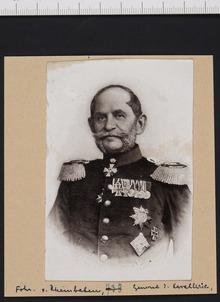Albert von Rheinbaben
Karl Wilhelm Gustav Albert Freiherr von Rheinbaben (born May 3, 1813 in Breslau , † November 1, 1880 in Crossen ) was a Prussian general of the cavalry .
Life
origin
Albert came from the old Silesian noble family von Rheinbaben . He was a son of the later Prussian Lieutenant General Karl von Rheinbaben (1781-1843) and his second wife Adelheide Wilhelmine Helene, born von Zychlinski (born March 7, 1787 in Treppeln ; † September 29, 1855 ibid).
Military career
Rheinbaben was educated in the cadet house in Berlin and in August 1830 transferred as a second lieutenant to the 1st Cuirassier Regiment of the Prussian Army stationed in Breslau . Promoted to prime lieutenant in 1846 , he was promoted to the senior adjutantage early on , which placed him in command of the Austrian army in Hungary in 1849 . Rheinbaben was an adjutant at the General Command of VI. Army Corps in Breslau, when in the summer of 1849 they received the order to report on the course of the war between the Austrians and the Russians allied with them against the rebellious Hungarians . In the same year he received his promotion to Rittmeister . From 1850 Rheinbaben was a general staff officer and received the Red Eagle Order IV class in 1852 .
In 1853 he was transferred to the General Staff of the 11th Division as a captain , and in 1855 he became the military companion of Prince Albrecht of Prussia . With him he toured Italy, Sweden, France and Norway. Promoted to major in 1854 , he returned to military service in 1857 as a staff officer in the Gardes du Corps regiment . From July 9, 1857 he was in command of the 2nd Cuirassier Regiment . In the same year he inherited the Treppeln estate in the Crossen / Oder district from his late uncle Zychlinski. March 25, 1858 to January 28, 1863 he was commander of the Guards Cuirassier Regiment and has since 1859 to lieutenant colonel , and on the occasion of the coronation of William I in Koenigsberg on 18 October 1861 Colonel promoted. In 1863 he became commander of the 2nd Guards Cavalry Brigade and in 1865 Major General . Rheinbaben took part in the German War in Bohemia in 1866 as commander of the 1st Light Cavalry Brigade in the 1st Army Cavalry Corps. At the head of his brigade he rode a victorious attack at Königgrätz .
After the end of the war, Rheinbaben was in command of the 3rd Guards Cavalry Brigade from October 30, 1866 to January 13, 1868 , then was commander of the 9th Division and in this position was promoted to Lieutenant General on March 22, 1868 .
In the war against France in 1870/71 he was the commander of the 5th Cavalry Division in the 2nd Army. It numbered eight cavalry regiments (as a rule there were only four to six) and on August 6, 1870, he successfully intervened in the battle near Spichern . The division played a large part in the fighting on August 16 at Vionville , but did not fight there as a unit, but by brigade or regiment. In the Battle of Sedan it was used for reconnaissance and security purposes and during the siege of Paris it had to cover the siege troops against attacks from the west. In addition to numerous awards, Rheinbaben received the star with oak leaves and swords for the Order of the Red Eagle, 2nd class.
After the end of the war, Rheinbaben was initially again in command of the 9th Division and in November 1872 took over the post of General Inspector of Military Education . He succeeded General von Peucker and continued the reorganization of the cadet corps. In 1873 he was appointed General of the Cavalry and was awarded the Grand Cross of the Red Eagle Order with Swords. In the summer of 1880 he celebrated his fiftieth anniversary of service and on this occasion was appointed chief of the Schleswig-Holstein Dragoon Regiment No. 13 . Illness forced him to ask for his retirement. He received this on October 23, 1880 through a personal letter from Wilhelm I, with which he received the insignia of the Order of the Black Eagle , which was awarded to him on that day.
He retired to his estate at Treppeln near Crossen on the Oder . There he died a few days later on November 1, 1880.
family
Rheinbaben married on March 7, 1860 in Weimar Natalie von Mandelsloh (born January 3, 1829 in Dresden , † April 3, 1906 in Dessau ), the daughter of the Saxon major general Friedrich Max von Mandelsloh (1790-1871) and his wife Mathilde, born Countess Rudiger. The marriage had three children.
His wife was the chief stewardess of Marie von Sachsen-Altenburg , the wife of Prince Albrecht of Prussia . In 1884, after Albert's death, she sold the Treppeln estate and followed the prince couple to Braunschweig .
literature
- Kurt von Priesdorff : Soldier leadership . Volume 7, Hanseatische Verlagsanstalt Hamburg, undated [Hamburg], undated [1939], DNB 367632829 , pp. 280-283, no. 2296.
- Bernhard von Poten : Rheinbaben, Albert Freiherr von . In: Allgemeine Deutsche Biographie (ADB). Volume 28, Duncker & Humblot, Leipzig 1889, p. 379 f.
- Hans Wätjen: History of the family of Rheinbaben 1272-1976. 1976.
- Gothaisches genealogical pocket book of the baronial houses for the year 1866. P. 752.
Web links
Individual evidence
| personal data | |
|---|---|
| SURNAME | Rheinbaben, Albert von |
| ALTERNATIVE NAMES | Rheinbaben, Karl Wilhelm Gustav Albert Freiherr von (full name) |
| BRIEF DESCRIPTION | Prussian general of the cavalry |
| DATE OF BIRTH | May 3, 1813 |
| PLACE OF BIRTH | Wroclaw |
| DATE OF DEATH | November 1, 1880 |
| Place of death | Crosses |
